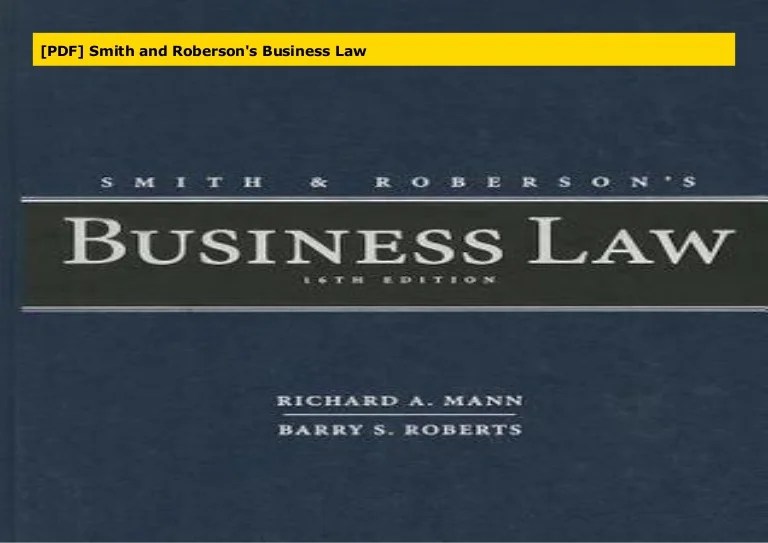Business law smith and roberson 17th edition – Welcome to the definitive guide to business law, brought to you by Smith and Roberson’s authoritative 17th edition. This comprehensive resource delves into the intricacies of business law, providing a thorough understanding of its principles and applications. Get ready to navigate the complexities of contracts, torts, property rights, employment law, and more, all while gaining invaluable insights into ethical decision-making and social responsibility in the business world.
Throughout this exploration, we will uncover the essential elements of business law, examining real-world scenarios and case studies to illustrate its practical implications. Join us as we unlock the legal framework that governs business transactions, empowering you to make informed decisions and navigate the challenges of the business landscape with confidence.
1. Business Law Framework: Business Law Smith And Roberson 17th Edition

The business law framework in the United States is a complex system of rules and regulations that govern business activities. This framework includes statutes, regulations, and case law.
Statutes are laws that are enacted by legislative bodies, such as Congress or state legislatures. Regulations are rules that are created by administrative agencies, such as the Securities and Exchange Commission (SEC) or the Environmental Protection Agency (EPA). Case law is the body of law that is created by court decisions.
Sources of Business Law
- Statutes
- Regulations
- Case law
Role of Courts
Courts play a vital role in the business law framework. Courts interpret statutes and regulations, and they resolve disputes between businesses and individuals.
2. Torts and Business Liability
A tort is a civil wrong that gives rise to a legal obligation to pay damages. Torts can be intentional or unintentional.
Types of Torts, Business law smith and roberson 17th edition
- Negligence
- Intentional torts
- Strict liability
Defenses to Tort Liability
- Contributory negligence
- Assumption of risk
3. Contracts in Business
A contract is a legally enforceable agreement between two or more parties. Contracts can be written or oral.
Elements of a Valid Contract
- Offer
- Acceptance
- Consideration
Process of Contract Formation
- Offer
- Acceptance
- Consideration
Remedies for Breach of Contract
- Damages
- Specific performance
- Injunctions
4. Business Organizations

There are many different types of business organizations, each with its own advantages and disadvantages.
Types of Business Organizations
- Sole proprietorships
- Partnerships
- Corporations
Advantages and Disadvantages of Each Type of Business Organization
| Type of Business Organization | Advantages | Disadvantages |
|---|---|---|
| Sole proprietorship | Easy to form and operate, low cost | Unlimited liability, limited access to capital |
| Partnership | More than one owner, shared liability | Unlimited liability, potential for conflict between partners |
| Corporation | Limited liability, access to capital | More complex to form and operate, double taxation |
5. Property Law in Business
Property law governs the ownership and use of property.
Types of Property Interests
- Real property
- Personal property
Principles of Real Property Law
- Law of fixtures
- Law of easements
Law of Personal Property
- Law of bailments
- Law of secured transactions
General Inquiries
What are the key elements of a valid contract?
Offer, acceptance, consideration, legality, capacity, and mutual assent.
What is the difference between negligence and intentional torts?
Negligence involves unintentional harm caused by a failure to exercise due care, while intentional torts involve deliberate actions that cause harm.
What are the different types of business organizations?
Sole proprietorships, partnerships, limited liability companies (LLCs), and corporations.
What is the purpose of employment law?
To protect the rights of employees and employers, ensuring fair treatment and compliance with labor laws.
What is the significance of business ethics?
Business ethics guide ethical decision-making, promote transparency, and foster trust between businesses and stakeholders.